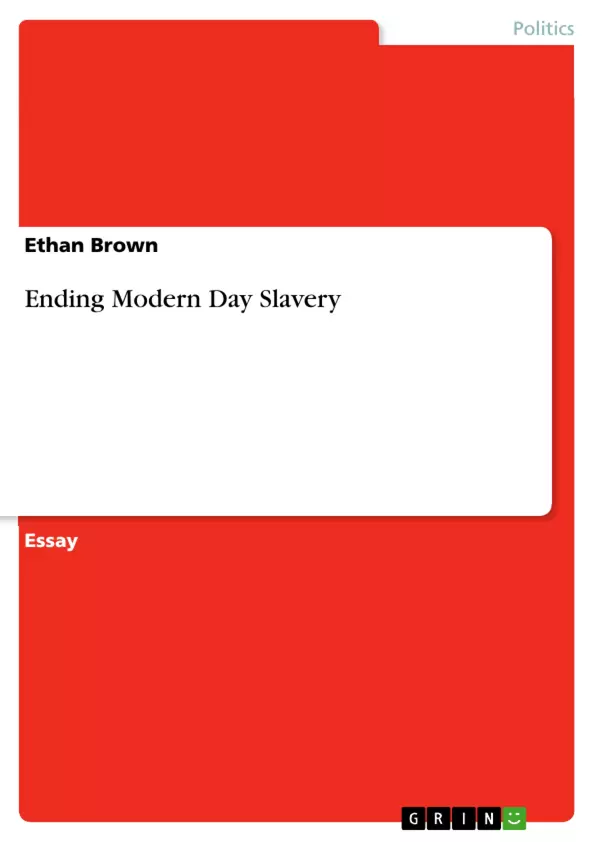One of the most underrated crimes in American History, and the least talked about is Human Trafficking. Human Trafficking is a multi-billion dollar business. People have started to take notice of it, but not the kind of notice where it should be talked about on a regular basis. There are simple steps the United States Government could do to help eradicate Human Trafficking, however, it is not being done. Human Trafficking is what we would call today as 'Modern Day Slavery'.
Inhaltsverzeichnis (Table of Contents)
- Problem
- Significance
- Solution
- Full Implementation
- Incremental
- Do Nothing
Zielsetzung und Themenschwerpunkte (Objectives and Key Themes)
This paper examines the issue of modern-day slavery, focusing on the United States' role in combating human trafficking. It explores the extent of the problem, the significance of the lack of action, and proposes solutions for addressing this critical issue.
- The prevalence of modern-day slavery and its economic impact.
- The inadequacy of current efforts to combat human trafficking.
- The need for a comprehensive approach, including the use of RICO, the cessation of foreign aid to countries with high trafficking rates, and collaboration with private organizations.
- The importance of addressing human trafficking at the border and within the United States.
- The urgency of action to prevent further escalation of the problem.
Zusammenfassung der Kapitel (Chapter Summaries)
Problem
This chapter highlights the alarming statistics surrounding modern-day slavery, comparing it to the historical slave trade. It emphasizes the vast profits generated by human trafficking and the inadequacy of current international responses.
Significance
This chapter focuses on the gravity of the human trafficking problem, emphasizing the lack of effective measures to combat it. It underscores the need for a more robust approach to address this modern form of slavery.
Solution
This chapter presents various solutions to combat human trafficking, including full implementation of the Trafficking Victims Protection Act (TVPA), incremental steps through partnerships with private organizations, and the importance of taking action rather than inaction. It also discusses the need for border enforcement and collaboration with local law enforcement.
Schlüsselwörter (Keywords)
Human trafficking, modern-day slavery, Trafficking Victims Protection Act (TVPA), RICO, foreign aid, prevention, protection, prosecution, border security, private organizations, law enforcement, United States.
Frequently Asked Questions
What is considered "Modern Day Slavery"?
Modern-day slavery primarily refers to human trafficking, a multi-billion dollar illegal business involving the exploitation of people for labor or sex.
What is the significance of the TVPA?
The Trafficking Victims Protection Act (TVPA) is a key U.S. law designed to prevent trafficking, protect victims, and prosecute traffickers.
How can the U.S. government help end trafficking?
Proposed steps include full implementation of laws, using RICO statutes against traffickers, and cutting foreign aid to countries that fail to address the issue.
Why is human trafficking often underrated as a crime?
Despite its scale, it is often not discussed enough in public discourse, leading to a lack of awareness and insufficient governmental action.
What role do private organizations play?
Collaboration with private organizations is essential for providing victim support and enhancing the reach of prevention programs.
- Citation du texte
- Ethan Brown (Auteur), 2015, Ending Modern Day Slavery, Munich, GRIN Verlag, https://www.grin.com/document/351779



